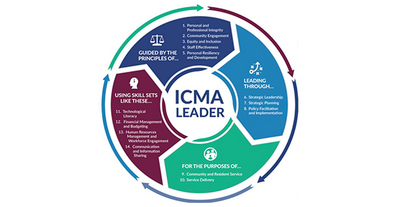
In the months since taking on the new role of managing director of Global Development and Engagement for ICMA, I have had the privilege of speaking to hundreds of local government professionals all over the world with the goal of uncovering new ways to create value for ICMA members, as well as to expand our footprint. It has been especially enlightening to learn about the vital role local government professionals play, not only in their communities but on the global stage. By developing and sharing best practices and following the ICMA Code of Ethics, local government professionals continue to improve the quality of life for their residents and create thriving communities, even though often those accomplishments go unrecognized.
The position of chief executive in local government has many titles, and the list of responsibilities and accountabilities is endless—almost impossible to capture. The level and breadth of skills required to effectively manage and lead communities, whether a village in India, a city in Denmark, or a county in the United States, can initially appear to be too divergent to capture under one umbrella, however massive.
Practices for Effective Local Government Leadership and Management

Fortunately, more than 30 years ago, ICMA members who comprised the Task Force on Continuing Education and Professional Development in collaboration with a broad cross-section of the membership, produced a set of 27 core competencies or practices that define the local government profession.
The Credentialing and Leadership Advisory boards have overseen the most recent update of those practices, which reflects changes in relevant research, technology, and events. These now 14 practices form the basis for the profession’s continuing education and the ICMA Credentialing Program. A complete list of the practices as well as a video can be found here.
Attracting and Retaining Talent
Local government leaders have told us that one of the most pressing issues they are confronting today is attracting and retaining qualified staff—in fact, the pandemic has exacerbated this problem globally. ICMA senior leaders have long recognized their responsibility to mentor early stage and mid-career professionals in order to create a pipeline for future executives. ICMA’s executive board is particularly keen to find solutions that will work to enhance the attractiveness of a career in public service—particularly for those just beginning their careers and those with several years of experience, who may feel their careers have stalled.
This objective dovetails perfectly with the work the Global Development and Engagement Team has been focusing on. We are exploring the opportunity to set global standards for the profession of local government leadership and management at all career stages. This includes an expanded definition of the local governance profession. As the only international membership organization dedicated to research, knowledge creation and dissemination, and networking for the local government profession, ICMA is the organization best positioned to do this. Our vision includes not only a recognition/credentialing component but a complete career development ecosystem that would support all aspects of skill building and career advancement.
14 Practices Resonate Globally
An important initial step has been to determine whether these 14 practices have global applicability. We recently conducted a survey that included input from 22 different countries across every geographic region. The findings soundly confirmed that all the practices are relevant, with Strategic Leadership, Community Engagement, and Financial Management topping the list.
It is exciting to find that these 14 practices resonated around the world. For example, one of our African affiliates said, “All the practices are relevant especially.... because with the introduction of a devolved government only 10 years ago, few resources for both management and leadership have been developed.” Another affiliate in Europe provided this feedback, “I believe that the general truths mentioned throughout the video (of the 14 practices) are applicable in every community and state that share our vision of democratic local government…. Thank you for this.”
The following chart summarizes the feedback we received:
With this confirmation in hand, we can embark on the next challenge. The 14 practices provide a foundation for establishing domains of expertise that will be further described and validated for each career stage through a newly formed community of practice. This group will be composed of volunteer subject matter experts from the ranks of ICMA member practitioners and academics recognized for their knowledge and dedication to advancing the profession. In addition to shaping and mapping the practices, they will advocate for, advise on, and keep the practices current.
A growing number of members, including Karen Pinkos, past ICMA president; Kelly McAdoo, chair of the International Committee; and Kate Fitzpatrick, chair of the Credentialing Advisory Board, will be helping to explore how best to move this initiative forward using the work that the Leadership Advisory Board began several years ago as a guide. A key consideration is looking at skills and expertise areas that are fundamental to the core practices and mapped across all career stages according to education and experience level, regardless of geopolitics and differences in titles. While these may seem like immense hurdles, we know from studying models of other professions that global credentialing and certifications are both feasible and valuable to hiring organizations and individuals.
Career Development Global Ecosystem
ICMA essentially began providing professional development experiences from the outset some 107 years ago. By leveraging proven practices and new technologies, we can bring together all of the elements that the organization has worked so hard to develop over this past century into an interactive, connected career development system that allows individuals to, in essence “choose their own adventure.” Components could include ICMA’s jobs portal, assessments, self-paced training, some version of Coach Connect, mentoring, conferences, credentialing, and certifications. Most importantly, by offering ways for local government professionals to assess and identify skills gaps, get training to bridge those gaps, and engage with peers and mentors who can contextualize experiences, those new to the profession will see a future for themselves, with a clear path for advancement and opportunity.
Testing the Fundamentals
As an initial test case for a professional development offering worldwide, ICMA launched “The Fundamentals of Local Government,” a 12-module training program that incorporates elements from the 14 practices. The modules are online so participants can learn at their own pace. Pilot group participants from Romania and Moldova are working through the modules, which take six months to complete. They will complete the program (depicted below) by the end of June.
What’s Next?
If there is one thing the incredibly challenging two-year pandemic period demonstrated to us, it is the common experience shared by local government professionals. It has been so inspiring to see the level of support they provided to one another in searching for and finding ways to best serve their citizens struggling to simply survive this prolonged crisis. They again are rallying to support their counterparts in Ukraine as local governments strive to provide services in a war zone.
What I have presented here is the foundation. The next steps are to build out the structure that will add dimension and breadth to the 14 domains. Local government professionals can expect that soon all of the ICMA products and services—from conference sessions to assessments--will explicitly refer to these domain areas. Ultimately, local government professionals will be able to achieve recognition for their knowledge, experience, and dedication to continuing professional development and their career accomplishments at every career stage.
I believe there is no better time than the present to create a global community of learning and achievement that will reinvigorate senior leaders, as well as inspire students and young professionals to join this rewarding and noble public service profession. I welcome your engagement with this effort and look forward to helping make this vision a reality.
New, Reduced Membership Dues
A new, reduced dues rate is available for CAOs/ACAOs, along with additional discounts for those in smaller communities, has been implemented. Learn more and be sure to join or renew today!
